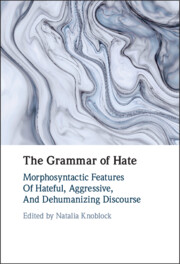Book contents
- The Grammar of Hate
- The Grammar of Hate
- Copyright page
- Contents
- Figures
- Tables
- Contributors
- Acknowledgments
- Introduction
- 1 Animacy and Countability of Slurs
- 2 Language Aggression in English Slang: The Case of the -o Suffix
- 3 Adj+ie/y Nominalizations in Contemporary English
- 4 Grammatical Gender and Offensiveness in Modern Greek Slang Vocabulary
- 5 Unseen Gender
- 6 The Neutering Neuter
- 7 Neutering Unpopular Politicians
- 8 The Power of a Pronoun
- 9 Is Play on Words Fair Play or Dirty Play?
- 10 Expressive German Adjective and Noun Compounds in Aggressive Discourse
- 11 ‘Kill the Invaders’
- 12 ‘I am no racist but …’
- 13 Homophobic Space–Times
- Index
- References
4 - Grammatical Gender and Offensiveness in Modern Greek Slang Vocabulary
Published online by Cambridge University Press: 30 June 2022
- The Grammar of Hate
- The Grammar of Hate
- Copyright page
- Contents
- Figures
- Tables
- Contributors
- Acknowledgments
- Introduction
- 1 Animacy and Countability of Slurs
- 2 Language Aggression in English Slang: The Case of the -o Suffix
- 3 Adj+ie/y Nominalizations in Contemporary English
- 4 Grammatical Gender and Offensiveness in Modern Greek Slang Vocabulary
- 5 Unseen Gender
- 6 The Neutering Neuter
- 7 Neutering Unpopular Politicians
- 8 The Power of a Pronoun
- 9 Is Play on Words Fair Play or Dirty Play?
- 10 Expressive German Adjective and Noun Compounds in Aggressive Discourse
- 11 ‘Kill the Invaders’
- 12 ‘I am no racist but …’
- 13 Homophobic Space–Times
- Index
- References
Summary
The derogatory meaning of slang words in Modern Greek can be reduced or increased with the use of diminutive or augmentative affixes respectively. The use of evaluative affixes often brings about a change in the grammatical gender of the derived word. A change of gender with or without the use of evaluative suffixes shows, among other things, the speaker’s attitude towards the referent. In general, diminutive words and derived words that keep the gender of the base are used with a less derogatory meaning than the word-base. On the other hand, derivative words that do not maintain the base gender are used with a more insulting/pejorative meaning than the word-base.
Keywords
- Type
- Chapter
- Information
- The Grammar of HateMorphosyntactic Features of Hateful, Aggressive, and Dehumanizing Discourse, pp. 82 - 96Publisher: Cambridge University PressPrint publication year: 2022
References
- 1
- Cited by

